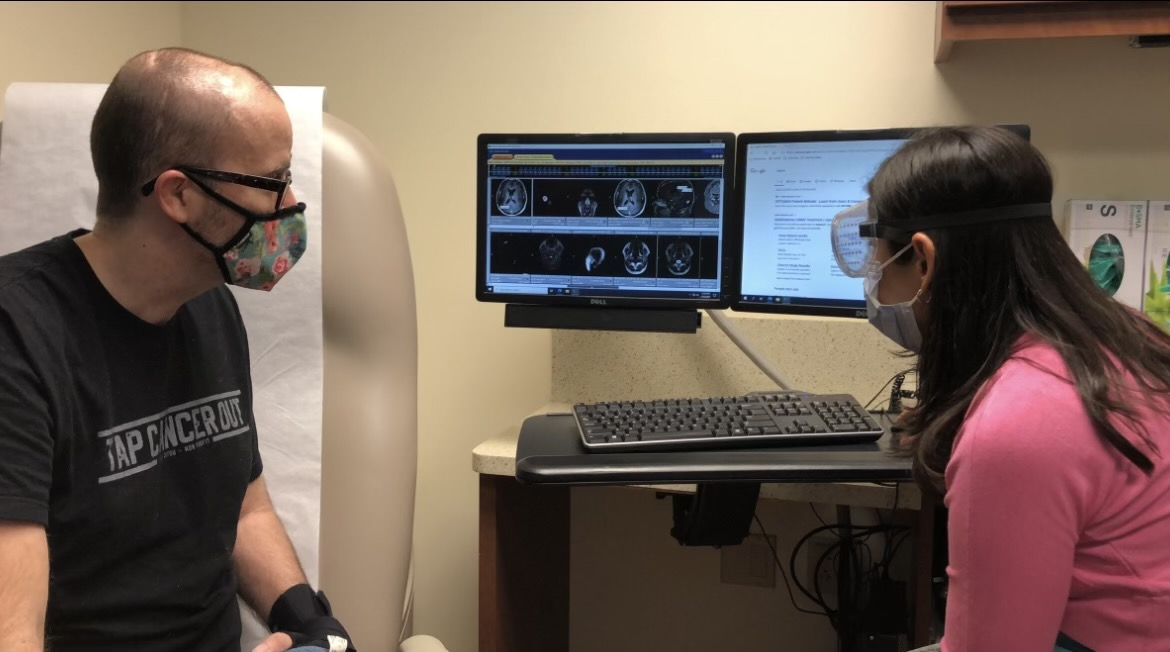Sophomore Claire King steps into her car as school comes to a close, confirming that her mask is still on to lessen the likelihood of spreading COVID-19 to her immunocompromised parents. While other students do not second guess throwing their masks onto the dashboard or into a trashcan, Claire does not have that luxury.
“[My daughter] Willow tells me she doesn’t want me to die several times per week,” Dana King, Claire’s mother, said.
Dana has the autoimmune connective tissue diseases lupus and scleroderma. She also has rheumatoid arthritis. The effects of COVID-19 can be similar to many of her autoimmune condition symptoms, such as swollen joints and joint damage.
“Having experienced childhood with a chronic autoimmune disease, I don’t want that for any child,” she said.
Claire’s dad, who has brain cancer, is also immunocompromised.
“Since my dad is on chemo, he is really weak,” Claire said. “If he got COVID, he would die.”
When the school board imposed a mask mandate in September, Claire and her family said they breathed a sigh of relief.
“People should consider that everyone around them has their own issues at home,” she said. “[The mask mandate] is really helpful, but I also think that teachers should be more strict on it. I would definitely feel better [if more students were vaccinated].”
Still, the mask mandate has done little to reduce Dana’s stress.
“I have been writing to the school board, the State Department of Education, and the State Department of Health,” she said. “I have been asking for mask mandates and for them to work on other mitigations such as increased ventilation, more testing availability, changes for situations like buses and lunchrooms and alternative schedules.”
Claire said dealing with COVID-19 has amplified her awareness of her parents’ conditions and made her more cautious.
“Most of the time, we wear masks in the car with the windows down,” Claire said. “We distance ourselves from each other.”
There is a sense of normality for Dana when dealing with illnesses despite the sudden threat of COVID-19 to others.
“We are used to discussions of prognosis, how much time my husband has left and how much time each treatment might give him,” Dana said.
Starting the school year, Claire considered a hybrid form of learning.
“I just wanted to [switch from hybrid], and we realized that it was probably going to be fine because my mom got a booster vaccination,” Claire said.
Dana said she has anxiety about her family contracting COVID-19 in school and bringing it home. She said she is more concerned about the general public.
“When elective procedures are canceled, staff is pulled from doctors’ offices and from all departments to handle a surge, my husband can’t access the care he needs as easily,” Dana said.
Although the stakes are high for the King family, the toll of home isolation proved too excessive for Claire and Willow.
“We consider the risk to their mental health to be higher than the risk of COVID, due to their vaccination status,” Dana said.
Minerva Rasalan, a neonatologist caring for newborns at Lawnwood Medical Center, saw COVID-19 rates rapidly rise. A difference between this year and last is the spike of cases occurring in younger people.
“Last week, we had over 100 people admitted due to COVID,” she said. “Last year, most of the admissions were elderly, over 65, and/or with other associates. [This year has] included young, healthy individuals in their 30s to 50s.”
Rasalan does not treat immunocompromised patients, like those with cancer or diabetes, but views pregnant women as vulnerable.
“At the end of July, 25-week twins were delivered because the mother went into cardiorespiratory arrest due to COVID,” Rasalan said. “She needed to have a tracheotomy tube because she was on the ventilator for several weeks.”
Rasalan has a son in school, and she said she supports the mask-mandate decision.
“Masks serve as a barrier for respiratory illnesses, not just COVID,” Rasalan said. “Because there is an effective vaccine available, and people have sort of gotten used to wearing masks and frequent hand washing/sanitizing, and social distancing, I am more comfortable.”
Rasalan advises people to take necessary measures against COVID-19.
“With the many studies that have proven safety and efficacy, I would urge people to get vaccinated,” she said.
Claire’s father progressed further into his cancer on Sept. 20, diminishing his place as a candidate for brain surgery. The wait to examine his condition took 16 hours due to hospital capacity, a disappointing parallel to his 16-year fight.
“Without COVID, he would have had unlimited visitation, and me there to advocate for him,” Dana said. “The way the emergency rooms and fire rescue have been strained this month has been terrifying for us. If this is the last month he has to live, it is going to be so much less peaceful than it would have been.”









